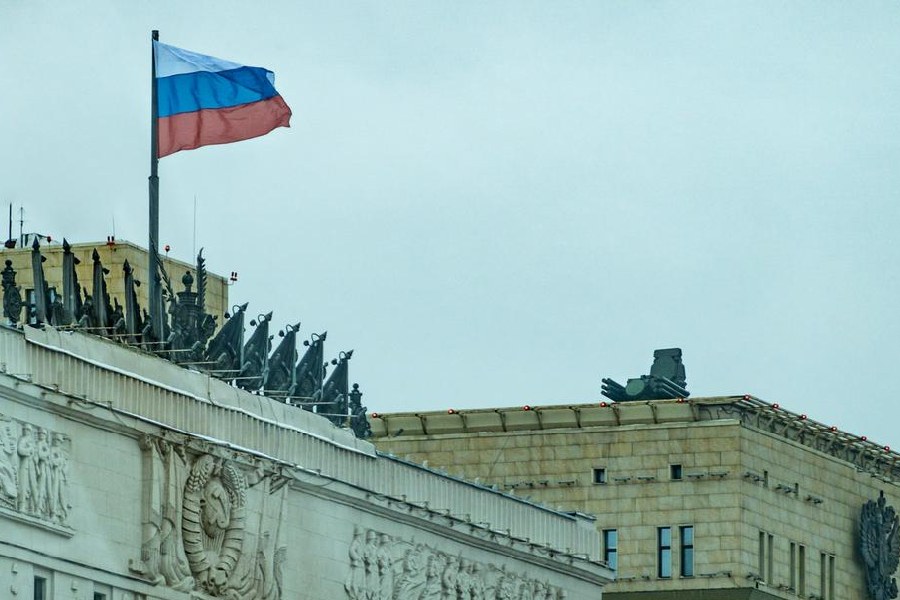Metro trains are running smoothly in Moscow, as usual, but getting around the city centre by car has become more complicated, and annoying because anti-drone radar interferes with navigation apps.
There are well-off Muscovites ready to buy western luxury cars, but there are not enough available. And while a local election for mayor took place as it normally would this month, many of the city’s residents decided not to vote, with the result seemingly predetermined (a landslide win by the incumbent).
Almost 19 months after Russia invaded Ukraine, Muscovites are experiencing dual realities: The war has faded into background noise, causing few major disruptions, and yet it remains ever-present in their daily lives.
This month, Moscow is aflutter in red, white and blue flags for the annual celebration of the Russian capital’s birthday, No. 876. Its leaders marked the occasion with a month-long exhibition that ended on September 10. Featuring the country’s largest hologram, it showcased the city of 13 million people as a smoothly operating metropolis with a bright future. More than 7 million people visited, according to the organizers.
There is little anxiety among residents over the drone strikes that have hit Moscow this summer, and no alarm sirens to warn of a possible attack. When flights are delayed because of drone threats in the area, the explanation is usually the same as the one plastered on signs at the shuttered luxury boutiques of western designers: “technical reasons”.
The city continues to grow. Cranes dot the skyline, and there are high-rise buildings going up all over town. New brands, some homegrown, have replaced the flagship stores including Zara and H&M, which departed after the invasion began in February 2022.
“We continue to work, to live and to raise our children,” said Anna, 41, as she walked by a sidewalk memorial marking the death of Wagner mercenary leader Yevgeny Prigozhin. She said she worked in a government ministry, and like others interviewed, she did not give her last name because of a fear of retribution.
But for some, the effects of war are landing harder.
Nina, 79, a pensioner who was shopping at an Auchan supermarket in northwestern Moscow, said that she had stopped buying red meat entirely and that she could almost never afford to buy a whole fish.
“Just right now, in September, the prices rose tremendously,” she said.
Nina said that sanctions and ubiquitous construction projects were some reasons for higher prices, but the main reason, she said, was “because a lot is spent on war”.
“Why did they start it at all?” Nina added. “Such a burden on the country, on people, on everything. And people are disappearing — especially men.”
When asked about the biggest problems facing Russia, more than half the respondents in a recent poll by the independent Levada Centre cited price increases.
The war, known in Russia as the “special military operation,” came in second, with 29 per, tied with “corruption and bribery”.
“In principle, everything is getting more expensive,” said Aleksandr, 64, who said he worked as an executive director in a company. His shopping habits at the grocery store have not changed, but he said he had not traded in his luxury western-branded car for a newer model.
“First of all, there are no cars,” he said, noting that most western dealerships had left Russia and that Chinese brands had been taking their places on the roads.
The war has made itself evident outside supermarkets and auto dealerships. Moscow may be one of the few cities in Europe without sold-out showings of the movie Barbie.
Warner Bros, which produced the film, pulled out of Russia shortly after President Vladimir Putin invaded Ukraine, and bootleg copies of Barbie were shown only in a few underground screenings.
Theatres regularly show movies that premiered more than five years ago because of licensing issues and strict new laws banning any mention of LGBTQ people.
Advertisements to join the military are plastered on roadside billboards and on posters in convenience stores.
Moscow’s metro recently stopped making announcements in English, with a Russian-language voice announcing every stop twice.
Cosmetically, Moscow is changing, too. A statue of Felix Dzerzhinsky, founder of the Soviet political police, was inaugurated this past week in front of the headquarters of the foreign intelligence services.
It is a copy of a statue that stood in front of the headquarters of the KGB until it was torn down in 1991 by Russians hungry for freedom.
The election for mayor also underscored the sea change in Russian politics.
A decade ago, Opposition politician Alexei Navalny stood as a candidate against Sergey Sobyanin, 65.
Now Navalny is in jail, and there was no real competition for Sobyanin, who won a third term with an unprecedented 76 per cent of the vote.
Other parties, including the Communist Party, fielded a candidate against the incumbent, but they are all considered “systemic Opposition” parties, or groups in parliament nominally in Opposition but who align their policies with the Kremlin on most issues.
“Before the war, I still voted,” said Vyacheslav Bakhmin, a chair of the Moscow Helsinki Group, the oldest human rights group in Russia. “I don’t want to vote now because, well, the result seems to be clear, right?”
Many in Moscow chose not to vote, although turnout was at a two-decade high because of electronic voting that allows Muscovites to cast a ballot online.
There is also heavy-handed encouragement of public-sector employees to vote.
New York Times News Service











